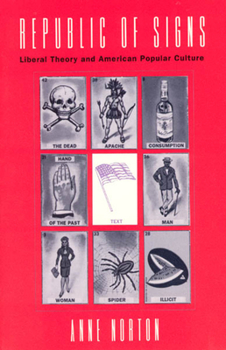Republic of Signs: Liberal Theory and American Popular Culture
Select Format
Select Condition 
Book Overview
Norton examines the enactment of liberal ideas in popular culture; in the possessions of ordinary people and the habits of everyday life. She sees liberalism as the common sense of the American people: a set of conventions unconsciously adhered to, a set of principles silently taken for granted. The author ranges over a wide expanse of popular activities (e.g. wrestling, roller derby, lotteries, shopping sprees, and dining out), as well as conventional political topics (e.g., the Constitution, presidency, news media, and centrality of law). Yet the argument is pointed and probling, never shallow or superficial. Fred and Wilma Flintstone are as vital to the republic as Franklin and Eleanor Roosevelt. "In discussions that range from the Constitution and the presidency to money and shopping, voting, lotteries, and survey research, Norton discerns and imaginatively invents possibilities that exceed recognized actualities and already approved opportunities."-Richard E. Flathman, American Political Science Review " S]timulating and stylish exploration of political theory, language, culture, and shopping at the mall . . . popular culture at its best, informed by history and theory, serious in purpose, yet witty and modest in tone."-Bernard Mergen, American Studies International
Format:Paperback
Language:English
ISBN:0226595137
ISBN13:9780226595139
Release Date:November 1993
Publisher:University of Chicago Press
Length:204 Pages
Weight:0.70 lbs.
Dimensions:0.5" x 5.5" x 8.5"
Customer Reviews
1 rating
Engaging, provocative, and funky!
Published by Thriftbooks.com User , 25 years ago
Norton seeks to show how Americans' political theory interacts with popular culture. For example, she sees in mass reproduction of art a commitment to egalitarianism; in our consumption of ethnic food is our acceptance of foreign cultures. In fact, she argues that we express our freedom through consumption, and that consumption functions to provide us with powerful signs of our freedom and individuality. Hence the absence of consumer goods in the Soviet Union was one of the most memorable aspects of communism for Americans, who see in an absence of consumer choice an absence of freedom, since you could no longer use the signs of consumption to express yourself. Looking at consumption is for her, though, only one way to look at ways that we represent ourselves. Other ways are by speaking,voting, and through texts such as the Constitution. Norton discusses the particularities of each of these sign systems and how the forms of sign-giving intersect with freedom and authenticity.The book is extremely provocative. After reading it I found myself constantly analyzing *everything* according to her schema, trying to figure out what kinds of values are manifested in different political and non-political acts. I recommend it to anyone interested in looking deeper into popular and political culture.





